Module 1 Unit 3 Language in use课件
文档属性
| 名称 | Module 1 Unit 3 Language in use课件 | 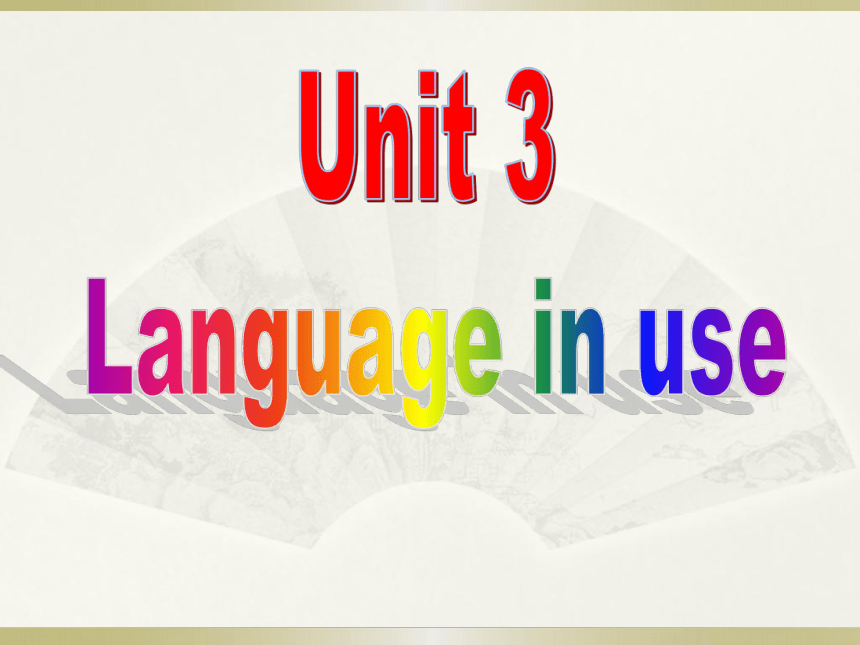 | |
| 格式 | zip | ||
| 文件大小 | 2.7MB | ||
| 资源类型 | 教案 | ||
| 版本资源 | 外研版 | ||
| 科目 | 英语 | ||
| 更新时间 | 2017-09-22 14:11:00 | ||
图片预览

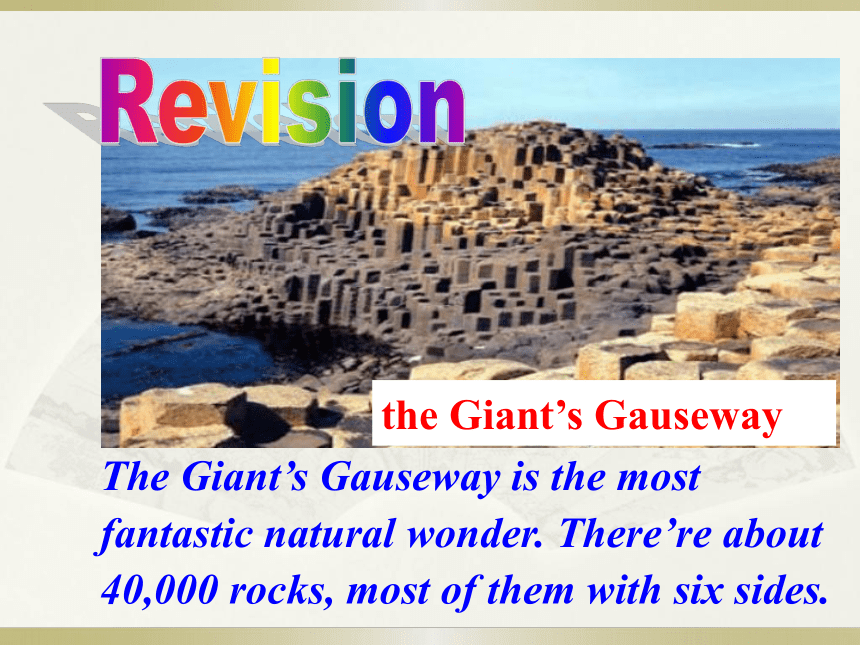
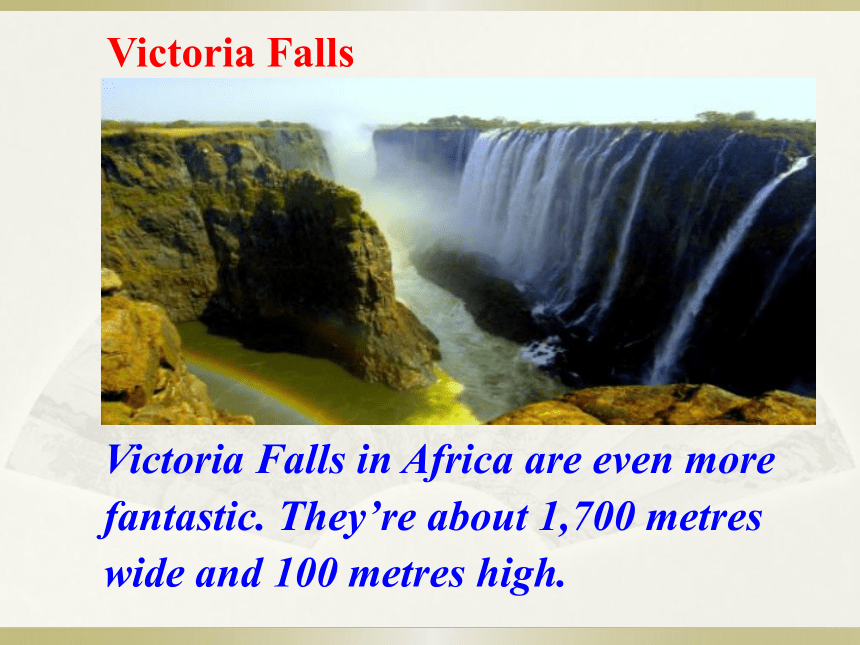
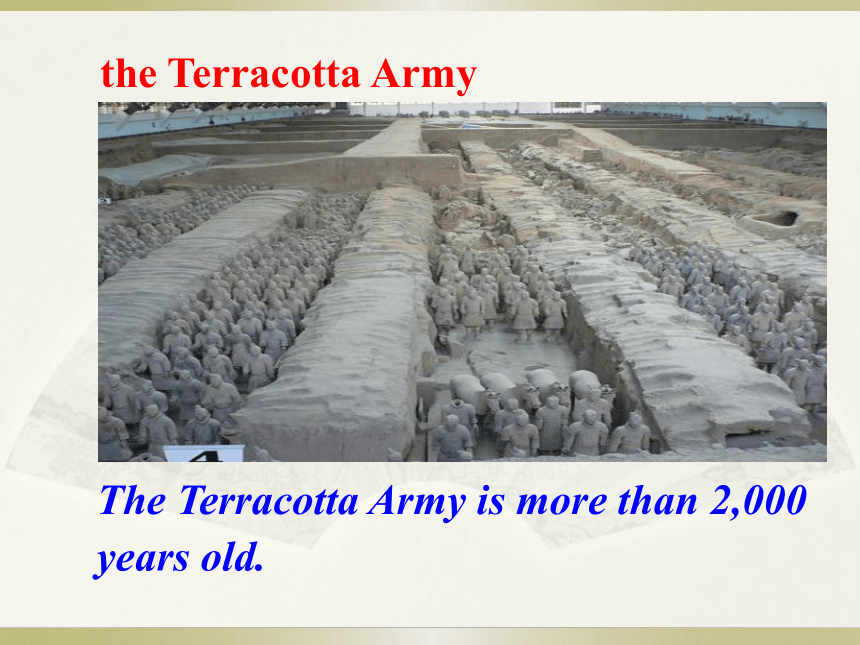
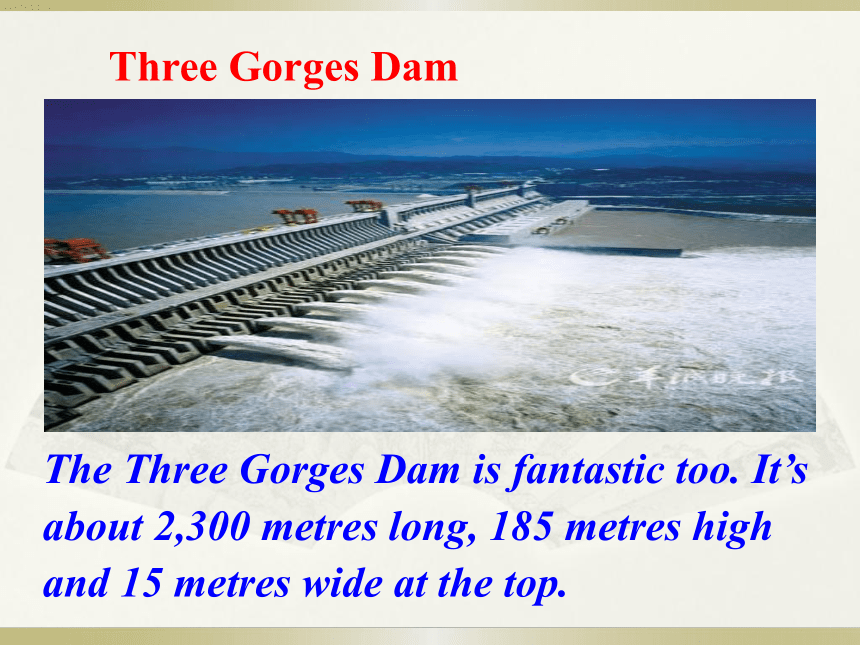
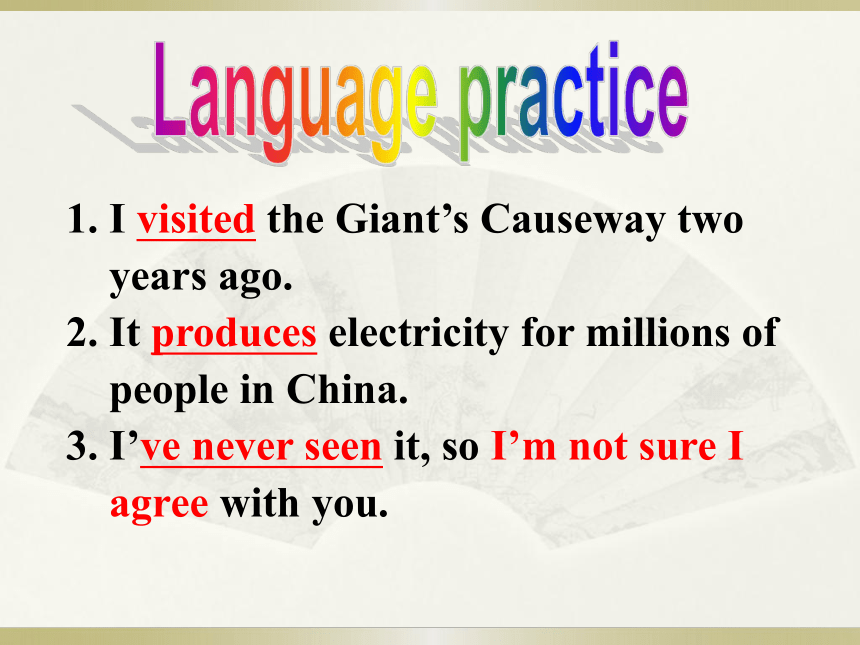
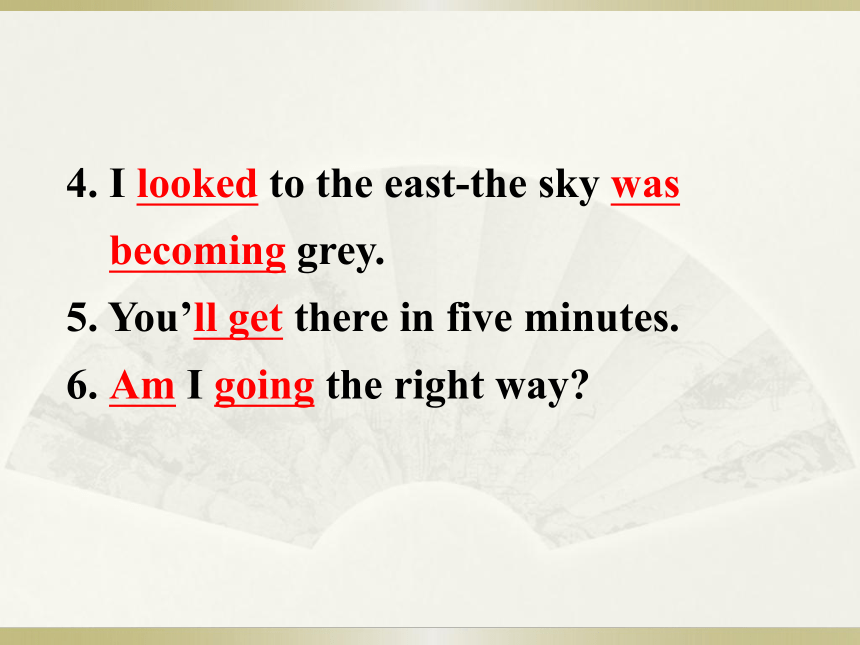
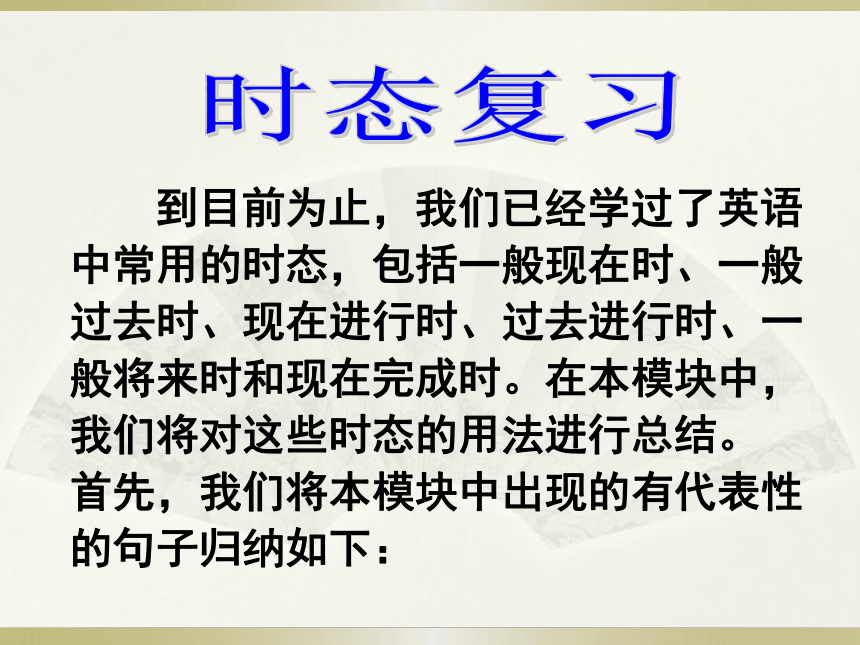
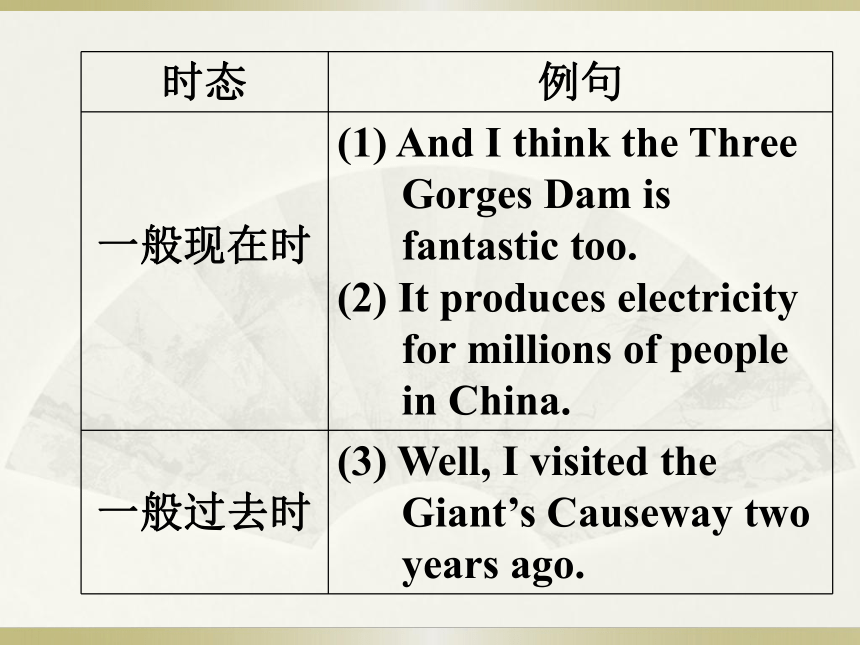
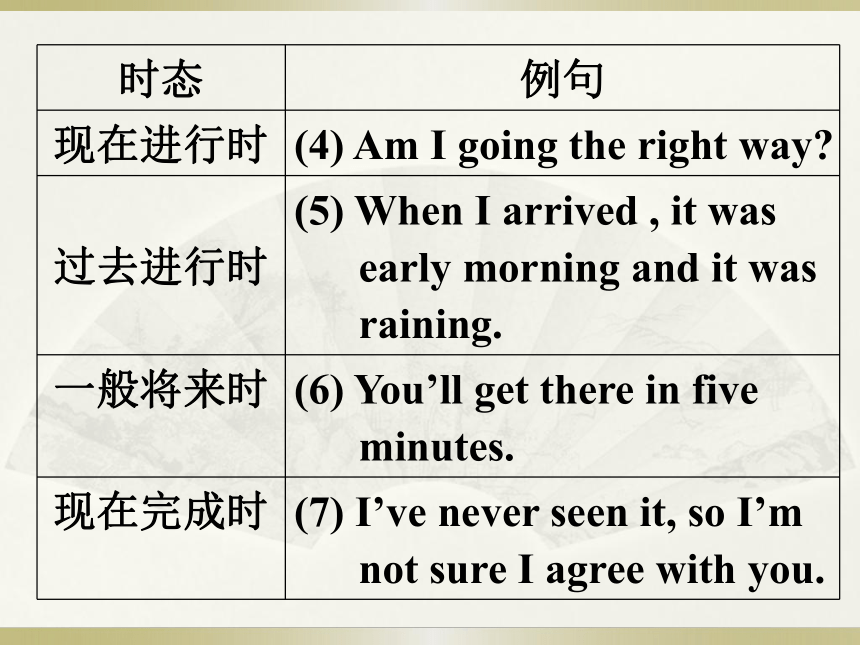
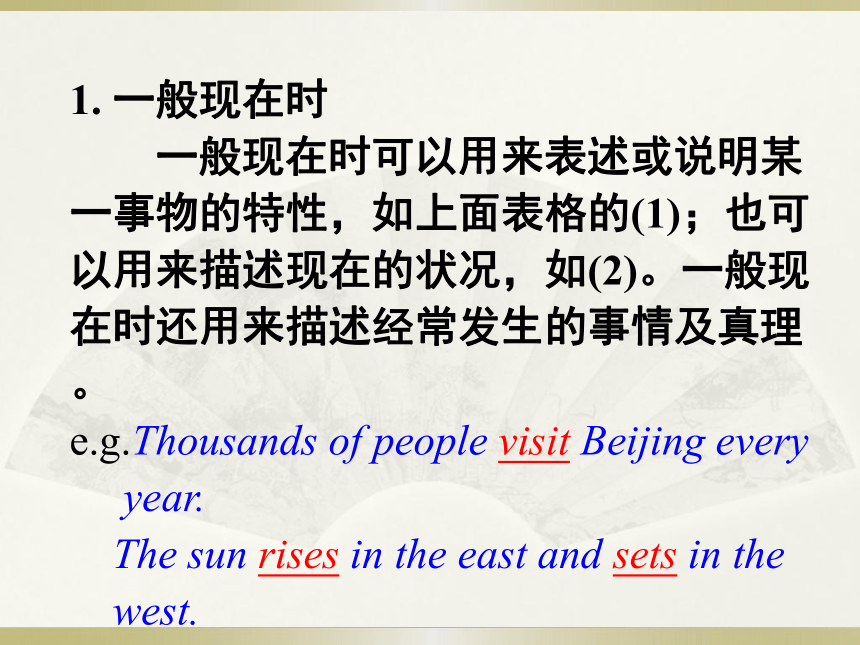
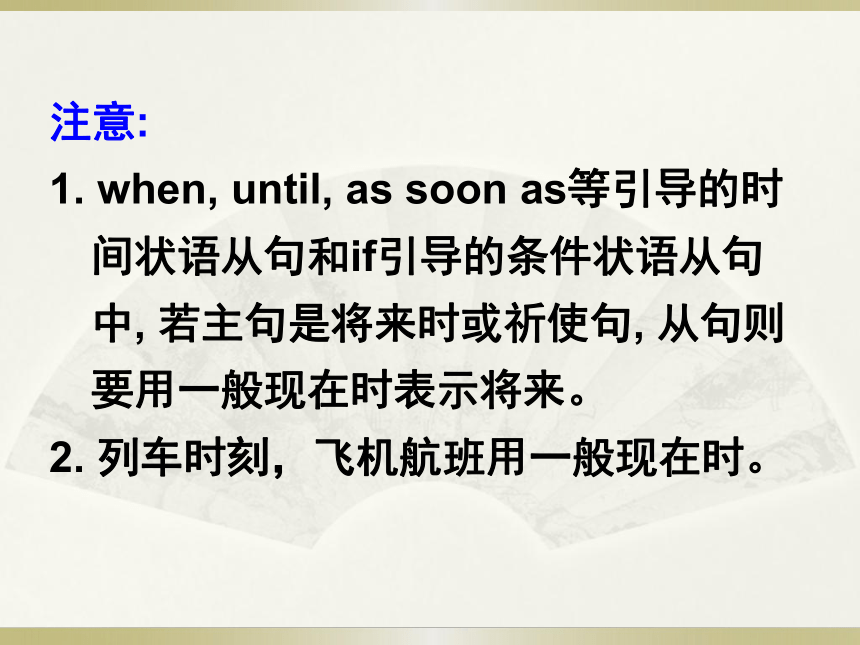
文档简介
课件50张PPT。Unit 3Language in useThe Giant’s Gauseway is the most fantastic natural wonder. There’re about 40,000 rocks, most of them with six sides. the Giant’s GausewayRevisionVictoria Falls Victoria Falls in Africa are even more fantastic. They’re about 1,700 metres wide and 100 metres high. the Terracotta Army The Terracotta Army is more than 2,000 years old. Three Gorges Dam The Three Gorges Dam is fantastic too. It’s about 2,300 metres long, 185 metres high and 15 metres wide at the top. Language practice1. I visited the Giant’s Causeway two
years ago.
2. It produces electricity for millions of
people in China.
3. I’ve never seen it, so I’m not sure I
agree with you.4. I looked to the east-the sky was
becoming grey.
5. You’ll get there in five minutes.
6. Am I going the right way? 时态复习 到目前为止,我们已经学过了英语中常用的时态,包括一般现在时、一般过去时、现在进行时、过去进行时、一般将来时和现在完成时。在本模块中,我们将对这些时态的用法进行总结。
首先,我们将本模块中出现的有代表性的句子归纳如下:1. 一般现在时
一般现在时可以用来表述或说明某一事物的特性,如上面表格的(1);也可以用来描述现在的状况,如(2)。一般现在时还用来描述经常发生的事情及真理。
e.g.Thousands of people visit Beijing every
year.
The sun rises in the east and sets in the
west.注意:
1. when, until, as soon as等引导的时间状语从句和if引导的条件状语从句中, 若主句是将来时或祈使句, 从句则要用一般现在时表示将来。
2. 列车时刻,飞机航班用一般现在时。2. 一般过去时
一般过去时可以用来表述过去某个时间发生的事情或行为,如上面表格中的(3)。一般过去时还可以用来描述事物过去的状态或过去经常发生的事情。
e.g.I was very thin in my childhood.
I got up very early when I was a
college student. 注意:
used to是过去时, 表示过去常常。
e.g. I used to take a walk in the morning.
我以前常常早晨散步。3. 现在进行时
现在进行时可以用来表述现在正在发生的事情或正在进行的行为,如表格中的(4)。现在进行时还可用来表示已经安排好的活动和事件。
e.g.My elder brother is coming tomorrow.
We are having a meeting tomorrow
morning.注意:
go, come, leave, fly等表示位移的动词的现在进行时可用来表示将来。
e.g. She is flying to London tomorrow.
她明天将飞往伦敦。4. 过去进行时
过去进行时表示在过去某段时间内正在发生的事情或行为,如表格中的(5)。从例句可以看出,过去进行时常常以一个过去的行为或时间为参照。
e.g.I was having breakfast when he
telephoned me.
What were you doing at eight o’clock
yesterday evening? 注意:
while从句中的动词只能是延续性动词,
when从句中延续性动词和非延续性动词
均可。
e.g. The phone rang while / when Mr Wang was sleeping on the sofa.
王先生正在沙发上睡觉时, 电话铃响了。5. 一般将来时
一般将来时表述的是发生在将来的事情或行为以及未来的状态,如表格中的(6)。在表示对将来的预测时(没有相关迹象表明某事必然会发生的情况下),will和be going to可以互换。
e.g. It will / is going to be a rainy day
tomorrow. 但在其他情况下,be going to更强调计划性,而will着重表达个人意愿或想法。
e.g. He is going to spend his vacation in
Hawaii.
I will give you the information when I
get it.注意:
there be结构的一般将来时常用There is /are going to be或There will be表示。
e.g. There is going to / will be a film this
evening.
今晚将有一场电影。 6. 现在完成时
现在完成时与一般过去时所表示的行
为都发生在过去,但是两者表达的重点不同:一般过去时表述过去的事情,现在完成时则强调过去的行为对现在的影响,如表格中的(7)。看对话,对比两种时态:
A: Have you seen the film?
B: Yes, I have.
A: When did you see it?
B: Last night.从对话中可以看出,当谈话重心在过去的时间、地点或人物,而不是事件的结果或影响时,要用一般过去时。反之,如果我们要强调的是过去的事情对现在的影响,则应该用现在完成时。
现在完成时还表示某个状态从过去某个时间开始,一直持续到现在。
e.g.I have lived here for a long time.
I have been ill for a week. 注意:
have been to 曾去过某地, 表示一种经历have gone to 到某地去了
e.g. My father has been to Shanghai twice.
我父亲去过两次上海。
Mr Wang isn’t here. He has gone to
Dalian.
王先生不在这儿, 他去大连了。下面我们来总结一下各种时态中一般疑问句和否定句的构成 (以do为例):1. Explain the differences in
meaning between Sentences a)
and b).
1. a) I often play basketball.
b) I am playing basketball now.
2. a) She has gone to the Great Wall.is what I do regularly.
is what I’m doing now.
She is still at the Great Wall. b) She has been to the Great Wall.
3. a) They had an English class
yesterday.
b) They were having an English class
at nine o’clock yesterday morning.She has come back from the Great Wall.
They did it once in the past.
They were doing something at a
specific time. 4. a) He is doing an interview.
b) He has done an interview.
5. a) We are drawing a picture of
Victoria Falls now.
b) We will draw a picture of Victoria
Falls.He’s doing the interview now.
He has already finished the interview.
We are drawing a picture now.
We will draw a picture in the future. 2.Complete the sentences with the correct form of the words in the box.appear finish give rain
talk visit walk 1. Listen! It _________ outside.
2. The great musician _____________
________ a concert in Guangzhou
next month.is raining will / is going to
give 3. Last summer, my parents ______
the Terracotta Army in Xi’an.
4. He _____ already __________ a new
book about travel.
5. Thousands of people ______
along the Great Wall every year.visitedhas finishedwalk 6. A few minutes later, a stranger
_________ at the end of the street.
7. The students ____________
about the journey to the Grand
Canyon when the teacher came into
the classroom.appearedwere talking The Jin Mao Building 3.Complete the passage with the correct form of the words in brackets.The sun was going down when we (1) _______ (arrive) at the ground floor of the building. I (2) ____ (be) afraid of going to the top of tall buildings, so I was a little nervous when I (3) ____________ (walk) into the lift. The lift (4) ________ (climb) faster and faster until we (5) _________
(reach) the 88th floor. It (6) _____ (be) arrivedwaswas walkingclimbedreachedwas high up there, but I was not afraid when I stood at the top.
The Jin Mao Tower in Shanghai, one of the tallest buildings in the world, (7) ___ (be) 420.5 metres high. It was built in 1999, and it (8) ____ (have) a fantastic view of Pudong District and the centre of Shanghai. I really like the tower and I am sure I (9) _________ (visit) it again.ishaswill visit Talk about the wonders of the world you have or have not visited.
A: Have you ever visited the Great Wall?
B: Yes, I have. / No, I haven’t.
A: When did you visit it? / When will you
visit it?
B: I visited it five years ago. / Maybe I’ll
visit it next year.Work in pairs Now complete the table. 5.Complete the sentences with the correct form of the words in the box. There is one extra word.ancient high long natural opinion wonder 1. The Changjiang River is about 6,300
kilometers _________.
2. The Terracotta Army is a famous
___________ wonder in China.longancient 3. For my homework I have to write
an article about the _________ of
the world.
4. Mount Qomolangma is the ________
mountain in the world.
5. In my ________, the Great Wall
is the greatest man-made wonder in
the world.wondershighestopinion the Louvre Museum卢
浮
宫6.Complete the passage with the expressions in the box. agree with at the bottom of
go through looking forward to millions of more than I’m really (1) ________________ my visit to the Louvre Museum in Paris. It’s the most visited museum in the world-every year, (2) __________ people visit it. The Louvre is in an old building, but tolooking forward tomillions of get inside you must (3) __________ a giant glass pyramid that is (4) _________ 20 metres tall. The entrance to the museum is (5) ______________ the pyramid. Some people do not like the glass pyramid. They say it looks too new and does not suit the older building. I do not (6) ____________ them. I think it looks great!go throughmore thanat the bottom ofagree with Think about three other wonders of the world and talk about them.
A: Where is …?
B: It’s…
A: How high is it?
B: It’s …metres high.Work in pairs Around the worldStonehengea man-made wonder of the world Stonehenge is an ancient circle of stones in the south of England. It is about 5,000 years old. It was probably a place to bury dead people or a place to study the stars and the sky at night.
There are dozens of stones, and they are different in height. The stones came from about 200 kilometres away. Some of the stones are missing, but it’s still one of the most wonderful sights of the world. It is a wonder also because of this question: How did ancient people move these huge stones without machines to help them? No one knows the answer. Fill in the blanks.
Shape: (1) _____
Location: in (2) ___________ England
History: about 5,000 years oldcirclethe south ofDetails about stones:
There are dozens of stone,and they are (3) __________ in height.
They came from about (4)
________________ away. different200 kilometresPossible usage:
A place to (5) ________________
or study the stars and the sky at night.bury dead people HomeworkWork in groups of four. Make a poster about a wonder of the world.● Decide on the wonder of the world for your poster.
● Find out as much information as you can in books and on
websites. Think about: 1. Why should people visit the wonder?
2. What will people see there?
3. How can people get there?
4. How much does it cost to visit the wonder?
5. When is the best time to visit the wonder?
● Make a poster. Find some pictures showing the wonder.
years ago.
2. It produces electricity for millions of
people in China.
3. I’ve never seen it, so I’m not sure I
agree with you.4. I looked to the east-the sky was
becoming grey.
5. You’ll get there in five minutes.
6. Am I going the right way? 时态复习 到目前为止,我们已经学过了英语中常用的时态,包括一般现在时、一般过去时、现在进行时、过去进行时、一般将来时和现在完成时。在本模块中,我们将对这些时态的用法进行总结。
首先,我们将本模块中出现的有代表性的句子归纳如下:1. 一般现在时
一般现在时可以用来表述或说明某一事物的特性,如上面表格的(1);也可以用来描述现在的状况,如(2)。一般现在时还用来描述经常发生的事情及真理。
e.g.Thousands of people visit Beijing every
year.
The sun rises in the east and sets in the
west.注意:
1. when, until, as soon as等引导的时间状语从句和if引导的条件状语从句中, 若主句是将来时或祈使句, 从句则要用一般现在时表示将来。
2. 列车时刻,飞机航班用一般现在时。2. 一般过去时
一般过去时可以用来表述过去某个时间发生的事情或行为,如上面表格中的(3)。一般过去时还可以用来描述事物过去的状态或过去经常发生的事情。
e.g.I was very thin in my childhood.
I got up very early when I was a
college student. 注意:
used to是过去时, 表示过去常常。
e.g. I used to take a walk in the morning.
我以前常常早晨散步。3. 现在进行时
现在进行时可以用来表述现在正在发生的事情或正在进行的行为,如表格中的(4)。现在进行时还可用来表示已经安排好的活动和事件。
e.g.My elder brother is coming tomorrow.
We are having a meeting tomorrow
morning.注意:
go, come, leave, fly等表示位移的动词的现在进行时可用来表示将来。
e.g. She is flying to London tomorrow.
她明天将飞往伦敦。4. 过去进行时
过去进行时表示在过去某段时间内正在发生的事情或行为,如表格中的(5)。从例句可以看出,过去进行时常常以一个过去的行为或时间为参照。
e.g.I was having breakfast when he
telephoned me.
What were you doing at eight o’clock
yesterday evening? 注意:
while从句中的动词只能是延续性动词,
when从句中延续性动词和非延续性动词
均可。
e.g. The phone rang while / when Mr Wang was sleeping on the sofa.
王先生正在沙发上睡觉时, 电话铃响了。5. 一般将来时
一般将来时表述的是发生在将来的事情或行为以及未来的状态,如表格中的(6)。在表示对将来的预测时(没有相关迹象表明某事必然会发生的情况下),will和be going to可以互换。
e.g. It will / is going to be a rainy day
tomorrow. 但在其他情况下,be going to更强调计划性,而will着重表达个人意愿或想法。
e.g. He is going to spend his vacation in
Hawaii.
I will give you the information when I
get it.注意:
there be结构的一般将来时常用There is /are going to be或There will be表示。
e.g. There is going to / will be a film this
evening.
今晚将有一场电影。 6. 现在完成时
现在完成时与一般过去时所表示的行
为都发生在过去,但是两者表达的重点不同:一般过去时表述过去的事情,现在完成时则强调过去的行为对现在的影响,如表格中的(7)。看对话,对比两种时态:
A: Have you seen the film?
B: Yes, I have.
A: When did you see it?
B: Last night.从对话中可以看出,当谈话重心在过去的时间、地点或人物,而不是事件的结果或影响时,要用一般过去时。反之,如果我们要强调的是过去的事情对现在的影响,则应该用现在完成时。
现在完成时还表示某个状态从过去某个时间开始,一直持续到现在。
e.g.I have lived here for a long time.
I have been ill for a week. 注意:
have been to 曾去过某地, 表示一种经历have gone to 到某地去了
e.g. My father has been to Shanghai twice.
我父亲去过两次上海。
Mr Wang isn’t here. He has gone to
Dalian.
王先生不在这儿, 他去大连了。下面我们来总结一下各种时态中一般疑问句和否定句的构成 (以do为例):1. Explain the differences in
meaning between Sentences a)
and b).
1. a) I often play basketball.
b) I am playing basketball now.
2. a) She has gone to the Great Wall.is what I do regularly.
is what I’m doing now.
She is still at the Great Wall. b) She has been to the Great Wall.
3. a) They had an English class
yesterday.
b) They were having an English class
at nine o’clock yesterday morning.She has come back from the Great Wall.
They did it once in the past.
They were doing something at a
specific time. 4. a) He is doing an interview.
b) He has done an interview.
5. a) We are drawing a picture of
Victoria Falls now.
b) We will draw a picture of Victoria
Falls.He’s doing the interview now.
He has already finished the interview.
We are drawing a picture now.
We will draw a picture in the future. 2.Complete the sentences with the correct form of the words in the box.appear finish give rain
talk visit walk 1. Listen! It _________ outside.
2. The great musician _____________
________ a concert in Guangzhou
next month.is raining will / is going to
give 3. Last summer, my parents ______
the Terracotta Army in Xi’an.
4. He _____ already __________ a new
book about travel.
5. Thousands of people ______
along the Great Wall every year.visitedhas finishedwalk 6. A few minutes later, a stranger
_________ at the end of the street.
7. The students ____________
about the journey to the Grand
Canyon when the teacher came into
the classroom.appearedwere talking The Jin Mao Building 3.Complete the passage with the correct form of the words in brackets.The sun was going down when we (1) _______ (arrive) at the ground floor of the building. I (2) ____ (be) afraid of going to the top of tall buildings, so I was a little nervous when I (3) ____________ (walk) into the lift. The lift (4) ________ (climb) faster and faster until we (5) _________
(reach) the 88th floor. It (6) _____ (be) arrivedwaswas walkingclimbedreachedwas high up there, but I was not afraid when I stood at the top.
The Jin Mao Tower in Shanghai, one of the tallest buildings in the world, (7) ___ (be) 420.5 metres high. It was built in 1999, and it (8) ____ (have) a fantastic view of Pudong District and the centre of Shanghai. I really like the tower and I am sure I (9) _________ (visit) it again.ishaswill visit Talk about the wonders of the world you have or have not visited.
A: Have you ever visited the Great Wall?
B: Yes, I have. / No, I haven’t.
A: When did you visit it? / When will you
visit it?
B: I visited it five years ago. / Maybe I’ll
visit it next year.Work in pairs Now complete the table. 5.Complete the sentences with the correct form of the words in the box. There is one extra word.ancient high long natural opinion wonder 1. The Changjiang River is about 6,300
kilometers _________.
2. The Terracotta Army is a famous
___________ wonder in China.longancient 3. For my homework I have to write
an article about the _________ of
the world.
4. Mount Qomolangma is the ________
mountain in the world.
5. In my ________, the Great Wall
is the greatest man-made wonder in
the world.wondershighestopinion the Louvre Museum卢
浮
宫6.Complete the passage with the expressions in the box. agree with at the bottom of
go through looking forward to millions of more than I’m really (1) ________________ my visit to the Louvre Museum in Paris. It’s the most visited museum in the world-every year, (2) __________ people visit it. The Louvre is in an old building, but tolooking forward tomillions of get inside you must (3) __________ a giant glass pyramid that is (4) _________ 20 metres tall. The entrance to the museum is (5) ______________ the pyramid. Some people do not like the glass pyramid. They say it looks too new and does not suit the older building. I do not (6) ____________ them. I think it looks great!go throughmore thanat the bottom ofagree with Think about three other wonders of the world and talk about them.
A: Where is …?
B: It’s…
A: How high is it?
B: It’s …metres high.Work in pairs Around the worldStonehengea man-made wonder of the world Stonehenge is an ancient circle of stones in the south of England. It is about 5,000 years old. It was probably a place to bury dead people or a place to study the stars and the sky at night.
There are dozens of stones, and they are different in height. The stones came from about 200 kilometres away. Some of the stones are missing, but it’s still one of the most wonderful sights of the world. It is a wonder also because of this question: How did ancient people move these huge stones without machines to help them? No one knows the answer. Fill in the blanks.
Shape: (1) _____
Location: in (2) ___________ England
History: about 5,000 years oldcirclethe south ofDetails about stones:
There are dozens of stone,and they are (3) __________ in height.
They came from about (4)
________________ away. different200 kilometresPossible usage:
A place to (5) ________________
or study the stars and the sky at night.bury dead people HomeworkWork in groups of four. Make a poster about a wonder of the world.● Decide on the wonder of the world for your poster.
● Find out as much information as you can in books and on
websites. Think about: 1. Why should people visit the wonder?
2. What will people see there?
3. How can people get there?
4. How much does it cost to visit the wonder?
5. When is the best time to visit the wonder?
● Make a poster. Find some pictures showing the wonder.
同课章节目录
- Module 1 Wonders of the world
- Unit 1 It's more than 2,000 years old.
- Unit 2 The Grand Canyon was not just big.
- Unit 3 Language in use
- Module 2 Public holidays
- Unit 1 My family always go somewhere interesting a
- Unit 2 We have celebrated the festival since the f
- Unit 3 Language in use
- Module 3 Heroes
- Unit 1 She trained hard,so she became a great play
- Unit 2There were few doctors, so he had to work ve
- Unit 3 Language in use
- Module 4 Home alone
- Unit 1 I can look after myself, although it won’t
- Unit 2 I became so bored with their orders that I
- Unit 3 Language in use
- Module 5 Museums
- Unit 1 Don't cross that rope!
- Unit 2 If you ever go to London, make sure you vis
- Unit 3 Language in use
- Module 6 Problems
- Unit 1 If I start after dinner, I'll finish it be
- Unit 2 If you tell him the truth now, you will sho
- Unit 3 Language in use
- Revision Module A
- Module 7 Great books
- Unit 1 We're still influenced by Confucius's idea
- Unit 2 It is still read and loved.
- Unit 3 Language in use
- Module 8 Sports life
- Unit 1 Daming wasn't chosen for the team last time
- Unit 2 He was invited to competitions around the w
- Unit 3 Language in use
- Module 9 Great inventions
- Unit 1 Will computers be used more than books in t
- Unit 2 Will books be replaced by the Internet?
- Unit 3 Language in use
- Module 10 Australia
- Unit 1 I have some photos that I took in Australia
- Unit 2 The game that they like most is Australian
- Unit 3 Language in use
- Module 11 Photos
- Unit 1 He's the boy who won the photo competition
- Unit 2 The photo which we liked best was taken by
- Unit 3 Language in use
- Module 12 Save our world
- Unit 1 If everyone starts to do something, the wor
- Unit 2 Repeat these three words daily: reduce, reu
- Unit 3 Language in use
- Revision Module B
